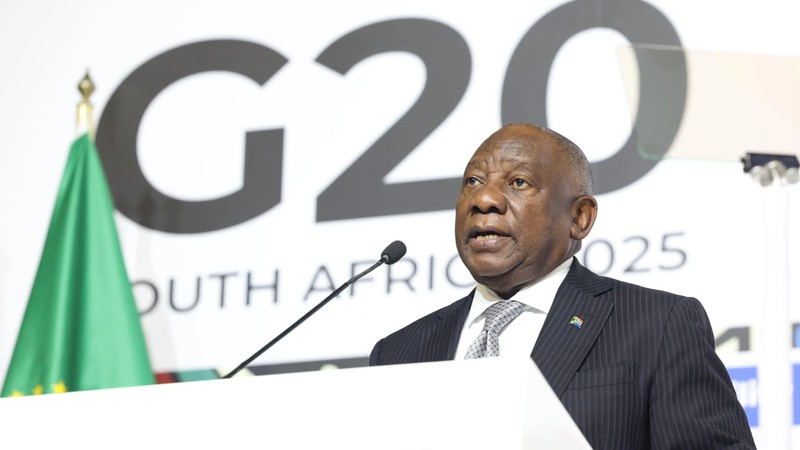South Africa’s G20 Presidency: Strategic diplomacy in a shifting global order
South Africa, as chair of the G20 Summit 2025, at a time when the international system is plagued by uncertainty due to the shifting global order, needs to manage its relationships with various powers strategically, balancing its interests with the West and the East to achieve desired outcomes, experts say.
The Group of Twenty (G20) is an international forum of both developing and developed countries that seeks to find solutions to global economic and financial issues, and its Presidency rotates annually among the members.
Dr Sonja Theron, a lecturer in Security Studies at the University of Pretoria’s Department of Political Sciences, said as the chair of the G20, South Africa is given an agenda-setting role and can influence which topics make it to the table.
“The G20 is ultimately a forum – a place for conversation. The directions those conversations take will be influenced by existing relationships and power dynamics, where South Africa holds some, but not extensive, agency and power. And ultimately, conversation may or may not lead to action,” Theron said.
She noted that the international system is plagued with uncertainty due to the shifting global order.
To navigate this to achieve desired outcomes, South Africa will have to carefully understand what leverage it does and does not have, and use this in directed and intentional efforts, and engage in the kind of strategic diplomacy witnessed during President Cyril Ramaphosa’s visit to the White House, Theron said.
She added that South Africa has often tried to position itself as a bridging actor between multiple forums and global camps such as the G7 and BRICS members within the G20, but this has often led to having to walk a fine line between partners, and Russia and the USA are prime examples.
“It is crucial that South Africa not overplay its hand and focus on where it has influence to exercise agency. This does not mean that South Africa needs to abandon its goals or principles but rather think strategically on where and how these can be advanced.
“We are witnessing a global withdrawal from multilateral processes and solutions. As such, South Africa should focus on incremental but transformative steps towards a more equitable world order. This could include initiatives that focus on more effective information gathering, sharing, and analysis, such as the Common Carbon Credit Data Model, the Borrowers’ Forum, and a Panel of Technical Experts to uncover the barriers to development in the global debt and finance system,” Theron said.
On South Africa’s presidency push for a more robust and transparent funding mechanism for countries affected by climate change, she said, such a large-scale initiative would be difficult to achieve in the current global climate.
“Not only are global powers less inclined to multilateralism, they are also less interested or incentivised to provide financial assistance. To achieve this, South Africa would need to build or leverage its relationships with the Global South and with global powers to ensure that the issue is championed across multiple forums and decision-making platforms,” Theron added.
On the de-dollarisation as a central theme in the BRICS, she said, “Taking a hard stance on de-dollarisation, in line with the BRICS agenda, will alienate the US further. South Africa’s options are then to either take a more moderate stance or prepare for the fallout of a strong position.”
Professor Fulufhelo Netswera, the executive dean for the Faculty of Management Sciences at the Durban University of Technology, said the G20’s participation of South Africa and its leadership will not yield anything substantive.
“The president of the US is not going to come here. So that in itself tells us that they don’t care about South Africa’s Presidency of the G20, and they are not going to care about the outcomes of that gathering,” Netswera said.
He highlighted that he doesn’t think that the G20 has ever done anything meaningful, if “we” go historically by resolutions taken.
“Not much has been implemented coming from this group. It’s a good group. I think big nations need to sit now and again, remind themselves about their commitment to humanity and to not destroy each other, and trade fairly, which is all good and nice,” he said.
On the reform of the Bretton Woods institutions, he said all the countries, including BRICS nations, have been talking about the lack of reform of the United Nations, the Security Council, the International Monetary Fund, the World Bank, and the World Trade Organisation.
“Anybody who believes that the Security Council, IMF and the World Bank should reform, should put a motion in the United Nations’ General Assembly. People talk about reform, but they don’t put a motion for the reform. How is that going to happen?
“It will never happen unless unless they put in a motion and the motion is voted for and approved or disapproved. If you don’t do that, the countries that have got the power in the Security Council and in the IMF and World Bank, are not going to just give up their voting power, in favour of everybody else because that takes away their leverage,” Netswera said.
He added that South Africa is highly idealistic in its approach and outlook. It believes in sustainability, equality, and solidarity and all of these concepts, but he thinks that the rest of the Global North does not care about these.
On de-dollarisation, Netswera said, “This lifeline that had been given to the dollar over the years is going to end very soon, just like the hegemony of the British pound ended. At the end, it is not about America, it’s not about the dollar, it is about what is in the best interest of everybody.”
gcwalisile.khanyile@inl.co.za

